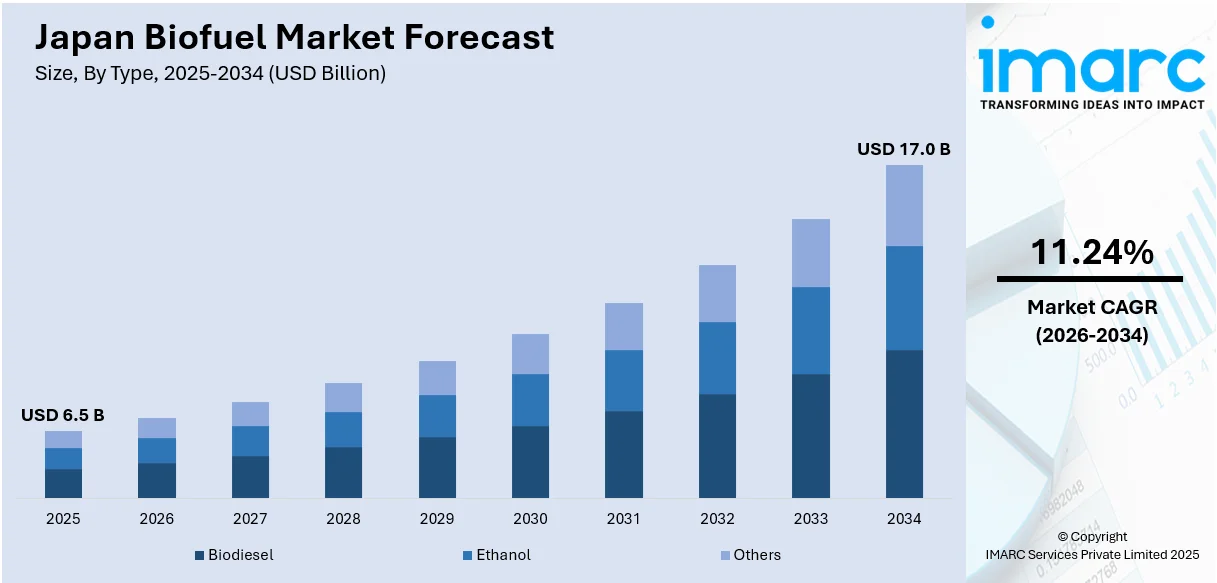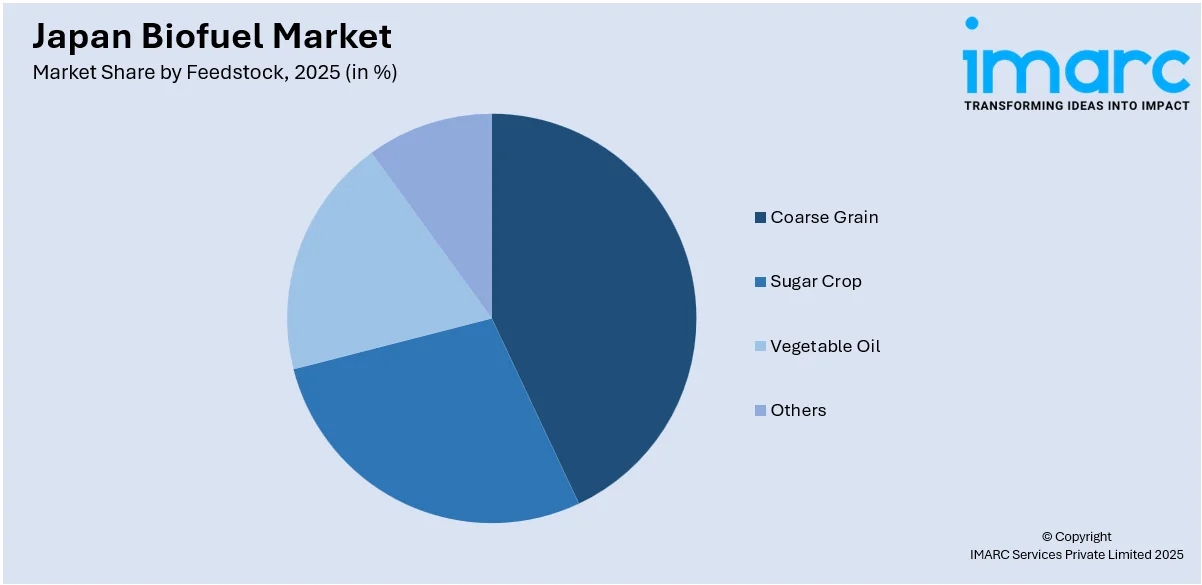
Japan Biofuel Market Size, Share, Trends and Forecast by Type, Feedstock, and Region, 2026-2034
Japan Biofuel Market Overview:
The Japan biofuel market size reached USD 6.5 Billion in 2025. Looking forward, IMARC Group expects the market to reach USD 17.0 Billion by 2034, exhibiting a growth rate (CAGR) of 11.24% during 2026-2034. Government policies promoting renewable energy, rising environmental awareness, technological advancements in biofuel production, and the need for energy security are some of the factors contributing to Japan biofuel market share. Additionally, Japan’s commitment to reducing greenhouse gas emissions and meeting renewable energy targets further fuels biofuel adoption.
|
Report Attribute
|
Key Statistics
|
|---|---|
|
Base Year
|
2025 |
|
Forecast Years
|
2026-2034
|
|
Historical Years
|
2020-2025
|
| Market Size in 2025 | USD 6.5 Billion |
| Market Forecast in 2034 | USD 17.0 Billion |
| Market Growth Rate 2026-2034 | 11.24% |
Japan Biofuel Market Trends:
Energy Efficiency and Cost Reduction in Biofuel Production
In Japan, a growing focus is on enhancing energy efficiency within the biofuel sector. Supported by government initiatives, biofuel companies are modernizing production lines to reduce costs, increase competitiveness, and ensure more affordable energy options for consumers. The shift towards upgrading equipment and utilizing energy-efficient technologies is expected to lower production expenses, addressing challenges such as high energy prices and equipment maintenance costs. By streamlining operations, these companies aim to not only strengthen their market position but also contribute to Japan's overall energy security. This transformation will help maintain local competitiveness and improve accessibility to sustainable, cost-effective energy solutions. These factors are intensifying the Japan biofuel market growth. For example, in September 2024, under the UNDP project "Multidimensional response to emerging human security challenges," 10 Japanese biofuel companies would enhance energy efficiency and modernize production lines with support from the government of Japan. This initiative aims to reduce production costs, boost competitiveness, and promote affordable energy access.

To get more information on this market Request Sample
Growth in Carbon-Neutral Fuels for Decarbonization
The Japan biofuel market is increasingly focused on the development and adoption of carbon-neutral fuels to support decarbonization efforts in the automotive sector. Biofuels, derived from plant materials that absorb CO2, are being recognized for their potential in reducing overall CO2 emissions throughout the product life cycle. These fuels offer significant benefits in terms of energy storage and transportation, making them highly suitable for widespread use in reducing the carbon footprint of automobiles. The push for carbon-neutral fuels is a key element of Japan's broader strategy to transition towards a carbon-neutral society, with a focus on integrating renewable energy sources into traditional industries to support sustainable growth. For instance, in May 2024, Idemitsu Kosan, ENEOS, Toyota, and Mitsubishi Heavy Industries launched a study to introduce and promote carbon-neutral fuels in Japan, aiming to contribute to automobile decarbonization and a carbon-neutral society. These fuels, including biofuels made from plant materials that absorb CO2 via photosynthesis, offer advantages in energy storage and transportation, making them suitable energy sources with reduced CO2 emissions across the product life cycle.
Japan Biofuel Market Segmentation:
IMARC Group provides an analysis of the key trends in each segment of the market, along with forecasts at the country and regional levels for 2026-2034. Our report has categorized the market based on type and feedstock.
Type Insights:
- Biodiesel
- Ethanol
- Others
The report has provided a detailed breakup and analysis of the market based on the type. This includes biodiesel, ethanol, and others.
Feedstock Insights:

Access the comprehensive market breakdown Request Sample
- Coarse Grain
- Sugar Crop
- Vegetable Oil
- Others
A detailed breakup and analysis of the market based on the feedstock have also been provided in the report. This includes coarse grain, sugar crop, vegetable oil, and others.
Regional Insights:
- Kanto Region
- Kansai/Kinki Region
- Central/Chubu Region
- Kyushu-Okinawa Region
- Tohoku Region
- Chugoku Region
- Hokkaido Region
- Shikoku Region
The report has also provided a comprehensive analysis of all the major regional markets, which include Kanto region, Kansai/Kinki region, Central/Chubu region, Kyushu-Okinawa region, Tohoku region, Chugoku region, Hokkaido region, and Shikoku region.
Competitive Landscape:
The market research report has also provided a comprehensive analysis of the competitive landscape. Competitive analysis such as market structure, key player positioning, top winning strategies, competitive dashboard, and company evaluation quadrant has been covered in the report. Also, detailed profiles of all major companies have been provided.
Japan Biofuel Market News:
- In May 2024, Subaru, Toyota, and Mazda announced plans to develop new engines tailored for electrification and carbon neutrality. These engines would optimize integration with electric drive units while being compatible with carbon-neutral (CN) fuels like biofuels and synthetic fuels. The compact engines aim to improve vehicle packaging, fuel efficiency, and aerodynamic performance.
Japan Biofuel Market Report Coverage:
| Report Features | Details |
|---|---|
| Base Year of the Analysis | 2025 |
| Historical Period | 2020-2025 |
| Forecast Period | 2026-2034 |
| Units | Billion USD |
| Scope of the Report |
Exploration of Historical Trends and Market Outlook, Industry Catalysts and Challenges, Segment-Wise Historical and Future Market Assessment:
|
| Types Covered | Biodiesel, Ethanol, Others |
| Feedstocks Covered | Coarse Grain, Sugar Crop, Vegetable Oil, Others |
| Regions Covered | Kanto Region, Kansai/Kinki Region, Central/Chubu Region, Kyushu-Okinawa Region, Tohoku Region, Chugoku Region, Hokkaido Region, and Shikoku Region |
| Customization Scope | 10% Free Customization |
| Post-Sale Analyst Support | 10-12 Weeks |
| Delivery Format | PDF and Excel through Email (We can also provide the editable version of the report in PPT/Word format on special request) |
Key Questions Answered in This Report:
- How has the Japan biofuel market performed so far and how will it perform in the coming years?
- What is the breakup of the Japan biofuel market on the basis of type?
- What is the breakup of the Japan biofuel market on the basis of feedstock?
- What is the breakup of the Japan biofuel market on the basis of region?
- What are the various stages in the value chain of the Japan biofuel market?
- What are the key driving factors and challenges in the Japan biofuel market?
- What is the structure of the Japan biofuel market and who are the key players?
- What is the degree of competition in the Japan biofuel market?
Key Benefits for Stakeholders:
- IMARC’s industry report offers a comprehensive quantitative analysis of various market segments, historical and current market trends, market forecasts, and dynamics of the Japan biofuel market from 2020-2034.
- The research report provides the latest information on the market drivers, challenges, and opportunities in the Japan biofuel market.
- Porter's five forces analysis assist stakeholders in assessing the impact of new entrants, competitive rivalry, supplier power, buyer power, and the threat of substitution. It helps stakeholders to analyze the level of competition within the Japan biofuel industry and its attractiveness.
- Competitive landscape allows stakeholders to understand their competitive environment and provides an insight into the current positions of key players in the market.
Need more help?
- Speak to our experienced analysts for insights on the current market scenarios.
- Include additional segments and countries to customize the report as per your requirement.
- Gain an unparalleled competitive advantage in your domain by understanding how to utilize the report and positively impacting your operations and revenue.
- For further assistance, please connect with our analysts.
 Request Customization
Request Customization
 Speak to an Analyst
Speak to an Analyst
 Request Brochure
Request Brochure
 Inquire Before Buying
Inquire Before Buying




.webp)




.webp)












